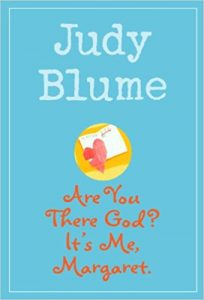The Power of Judy Blume
Kyle Labe//Blog Writer
Whenever Judy Blume is mentioned in conversation, there seems to be simultaneous nostalgia. Blume inspires an almost ubiquitous adoration, everyone having grown up with her novels, from Are You There God? It’s Me, Margaret, to Forever…, to Blubber and the Fudge series. Very rarely is there an author so universally loved. There is a certain power to being Judy Blume.

I find it so peculiar that a children’s writer is also one of the most banned authors in America. But that’s because Blume never shies away from putting to words the most intimate aspects of maturation. In her books, Blume has tackled puberty, menstruation, masturbation, sexual orientation, teen sexuality, virginity, grief, religion, racism, class, bullying, and more.
There are so many questions when one is an adolescent, but they all seems to circulate around one, overarching uncertainty: am I doing this right? When you’re growing up, it seems that everyone around you is so separate and distant from your problems. You have no real grasp on what’s happening, because so many things are going on at once, and you can’t seem to grab a hold onto any of it. There are resources, but truthfully, I, for one, preferred to bottle up my emotions rather than confer with my parents, and I also recognize that many people do not have the same stable relationship that my parents and I share. Schools, more often than not, fail in areas such as sex education, counseling, and bullying.
Blume knows this. In an appropriately-titled New York Times profile, “Judy Blume Knows All Your Secrets,” Blume recognizes that before she is a writer, she is a storyteller. Throughout the years, she never has lost touch with her audience. There is a comfort to reading, and in my case, rereading, Blume. She acknowledges questions that many children and young adults are too nervous in voicing, and approaches them in a method that is neither judgmental nor condescending.

Personally, my favorite Blume novel is the YA classic Forever…. Forever… is one of those magical books in that whatever point in my life I read it, I come out of it with something new. Not many things can cause me to say the same thing. At the outset, Forever… tells the story of a teenager dealing with the pressures of sex and first times, but there is so much more. There is the anxiety of leaving your previous lifestyle for a new one at college, and the reality behind first loves and first heartbreaks. It addresses teen pregnancy, birth control, and the question of abortion, and it explicitly confronts Planned Parenthood in a positive light. One of the most confusing variables of adolescence is the question of sex, yet Blume spins it all in here as if some Bible. It also contains one of my favorite quotes in literature: “It’s strange, but when it comes right down to it I never do fall apart—even when I’m sure I will.” That, in my opinion, encapsulates the novel as a whole, and what being a teenager feels like.
So many children’s and young adult books become disenchanting with age. Revisiting beloved stories, but now with experience you lacked as a kid, can sometimes be disheartening, as you discover flaws and holes you never noticed as a child. Viewing these stories critically can even prove more of a challenge. But I’ve never had that problem with Blume. There is never a new lesson in her books that can’t be found every time around. So what if Are You There God? It’s Me, Margaret concerns itself with the inner thoughts of a young girl? Issues of anti-semitism, religious identity, and insecurity don’t just leave, unfortunately. Blume’s books are remarkable for their ability to transport a reader back in time to their childhood, while concurrently retaining a relatability for any age. I remember when I reread Are You There God? It’s Me, Margaret last year, I was particularly struck by a passage in which the eponymous narrator’s mother sends her off traveling, yet warns her to only ask a woman if she needs help. It’s nothing more than half a page, but minuscule details such as these strike me now, when I don’t believe I would’ve noticed it back in junior high.
So yes, there is a power to Judy Blume. I, like most of American youth nowadays, owe a debt of gratitude to Blume for narrating our childhood with both candor and wit. While growing up can be one of the most isolating experiences in a person’s life, it’s nice to know future generations will never be alone as long as Blume’s novels stay in print.
